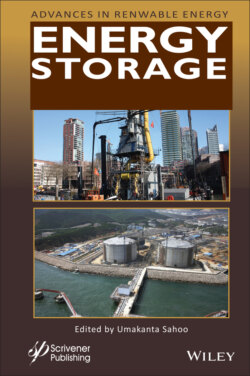Читать книгу Energy Storage - Группа авторов - Страница 29
1.3.4.1 Sensible Energy Storage
ОглавлениеThe sensible thermal storage system stores thermal energy with increases in the temperature of the TES material. The principle of the sensible thermal storage system is simple and it has been widely applied in CSP as well as other applications. The TES material undergoes temperature change during energy storage and release. The physical and chemical changes of storage material is not observed. Sensible thermal energy storage method is simple and inexpensive. One of the disadvantages of sensible thermal energy storage material is low thermal conductivity. This results in lesser energy storage and release capacity. Also, the sensible heat transfer materials have low energy storage density. This further leads to large sizes of the storage devices.
The amount of energy stored in the material (Q) can be calculated as
Where m is the mass of the material, Cp is the specific heat of the material at constant pressure and ΔT is the temperature difference.
Common sensible storage materials include water, steam, synthetic oil, molten salt, gravel, etc. [see Table 1.4]. As seen from Tables 1.1, 1.2 and 1.3, molten salt is widely used for sensible energy storage. Sensible thermal storage systems are mainly seen for low-temperature applications.
Research on sensible thermal storage is comparatively mature and has been developed to a commercially exploitative level. As the density of sensible thermal storage is low, sensible thermal devices typically have certain limitations due to their large sizes. Lucentini (2014) presented thermal storage of sensible heat using concrete modules in solar power plants. Tiskatine et al. (2017) carried out a detailed study on suitability and characteristics of rocks for sensible heat storage in CSP plants. For high-temperature sensible energy storage for CSP systems, the selection and analysis are done by Khare et al. (2013).
Table 1.4 Typical materials used in sensible heat TES storage (Mehling and Cabeza, 2008; Navarro et al., 2012).
| Material | Density (kg/m3) | Specific heat at constant pressure (J/kg K) |
| Clay | 1,458 | 879 |
| Brick | 1,800 | 837 |
| Sandstone | 2,200 | 712 |
| Wood | 700 | 2,390 |
| Concrete | 2,000 | 880 |
| Glass | 2,710 | 837 |
| Aluminium | 2,710 | 896 |
| Iron | 7,900 | 452 |
| Steel | 7,840 | 465 |
| Gravelly earth | 2,050 | 1,840 |
| Magnetite | 5,177 | 752 |
| Water | 988 | 4,182 |
